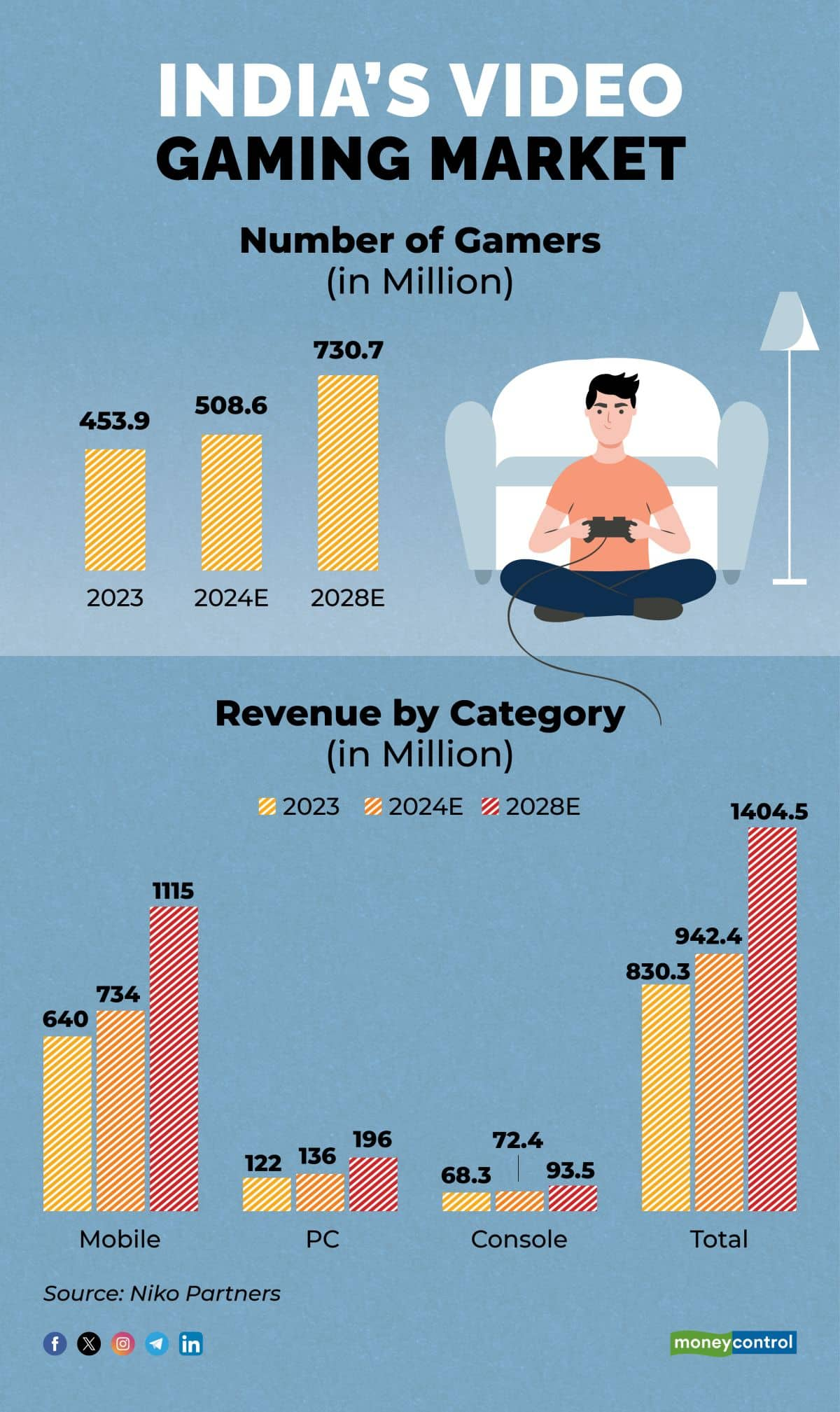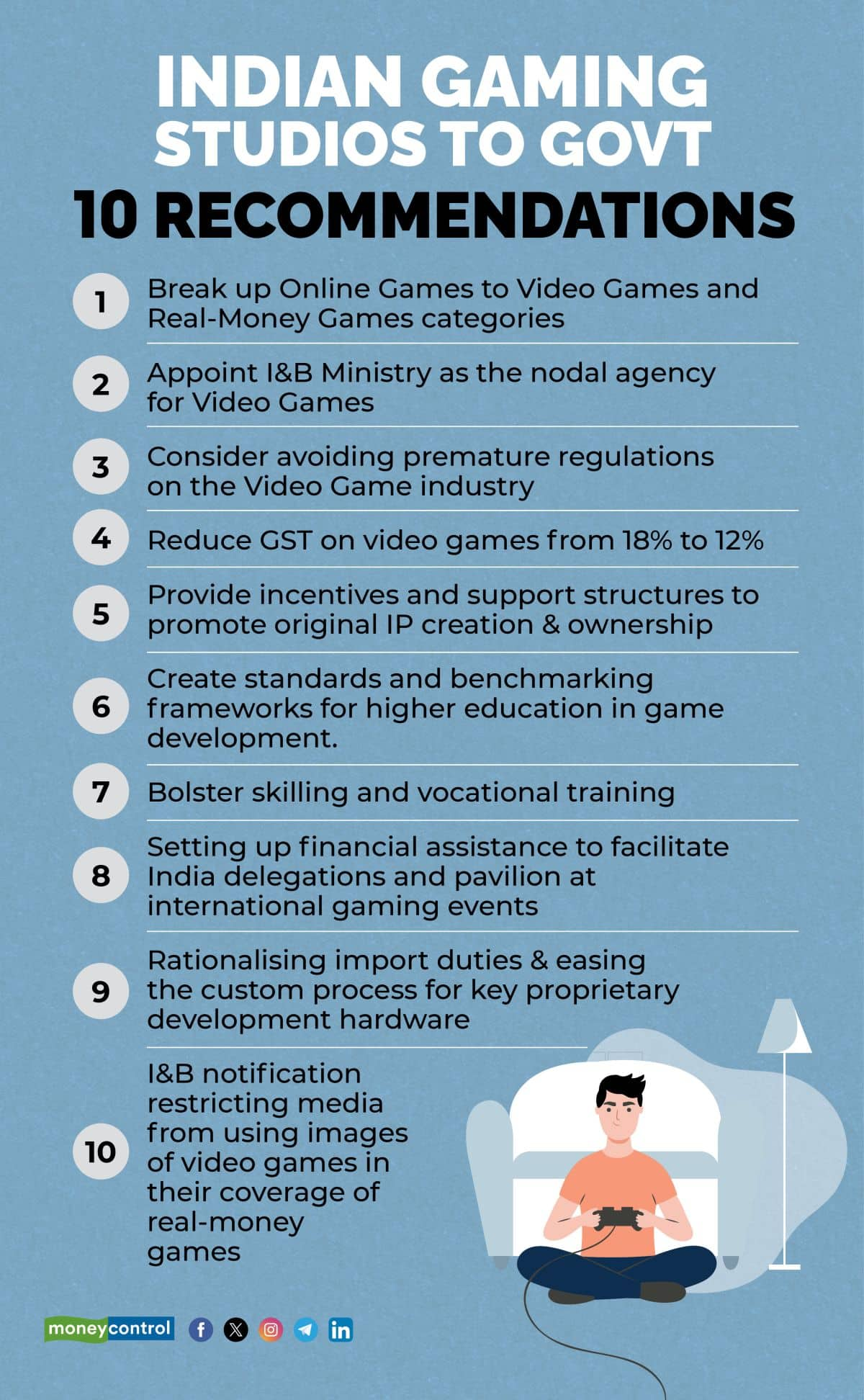



A group of 70 video game studios and esports companies, including Dot9 Games, Outlier Games, and SuperGaming, has written a letter to the Prime Minister's Office (PMO) seeking a comprehensive policy that clearly distinguishes between video games and real-money games (RMG), in line with global standards.
The letter, also sent to the information and broadcasting ministry, comes as the Narendra Modi-led National Democratic Alliance (NDA) government, voted back for the third consecutive term, draws plan to regulate the rapidly-growing online gaming sector.
The industry wants two separate categories — video games and real-money games — in the Indian policy framework to ensure fair and balanced policymaking while capturing the fine distinction between the two, says the July 8 letter, a copy of which has been reviewed by Moneycontrol.
It wants the information and broadcasting (I&B) ministry to be made the nodal agency for video games, along with creating a dedicated AVGC-XR wing within the ministry to headed by a joint secretary rank official.
AVGC-XR is short for Animation, Visual Effects, Gaming, Comics, and Extended Reality.
In December 2022, the government designated the ministry of electronics and information technology (MeitY) as the nodal ministry for all online gaming matters, while the esports sector was assigned to youth affairs and sports ministry.
"While video games are a form of software technology, they squarely come under the entertainment industry due to their primary function as a form of creative and artistic expression much like movies, web series," the letter says.
The requests are among the 10 recommendations made by gaming studios and other stakeholders to the PMO and I&B ministry as part of the national AVGC-XR policy to accelerate growth in the sunrise sector.
The move will streamline regulations, improve operational efficiency and facilitate collaboration with the AVGC-XR policy such that the video games industry is housed alongside other entertainment and media sectors, the companies say.
An AVGC promotion task force, set up by the Centre in 2022, recommended a National AVGC-XR Mission with a budgetary outlay for integrated promotion and growth of the sector. It also recommended a “Create in India” campaign to focus on content creation in India for India and for the world.
Union minister Ashwini Vaishnaw currently heads both MeitY and I&B ministry in the present government.
Nodding Heads Games, Hitwicket, 99Games, Newgen Gaming, Lila Games, and Masala Games are among the other firms to have signed the letter. The Electronic Sports Federation of India, a non-profit that promotes and organises esports in India, is also a signatory.
The companies have also sought an audience with PMO and the I&B ministry to "share the views of the video games industry in detail and seek guidance on the way forward".
 A snapshot of India's video games market
A snapshot of India's video games marketHarish Chengaiah, founder of Outlier Games said, “The Indian video game industry is projected to reach $1.6 billion by 2029, surpassing the cumulative revenues of all Indian film industries and becoming the largest entertainment industry in India before the end of this decade.
“We urge the government to take a measured and nuanced approach to video games as they have definite potential to spearhead India’s creative economy and soft power aspirations.”
Their several requests to be involved in policy discussions had gone unheard. “We hope at least now we get invited to deliberate on the unique circumstances of video games that are far different from real money games," said Chengaiah, who organised the representation.
In May, Modi had said the government wanted to cement India's leadership in the global gaming market. This was shortly after he engaged with some of the top Indian gamers on a host of issues relating to the gaming industry.
Earlier in the year, the then minister of state for IT Rajeev Chandrasekhar had said the government was progressing towards creating a framework to allow safe infrastructure and permissible gaming. The third term for Modi would establish a more stable and predictable regulatory environment, the minister said.
Video games vs real-money gamesCreating a distinction between video games and real-money games has been a long-pending request of gaming studios in India.
In the global north, a clear distinction is made between video games and games that involve monetary stakes and winnings, classified as iGaming. These categories are regulated separately to address their nuances to ensure fairness.
In India, they are clubbed under an umbrella term "online games".
The companies says the lack of differentiation has led to "widespread confusion" since the goods and services tax (GST) amendment came into effect in October 2023 as online games now exist in both 18 percent and 28 percent GST brackets.
In real-money games, where the transfer of money is involved, a 28 percent tax on the full face value of player deposits is levied. For free-to-play and paid video games, which are played purely for entertainment or leisure and do not involve staking or wagering, are taxed at an 18 percent GST rate.
Video gaming studios say many firms have been “unfairly affected” despite the lack of TDS or GST discrepancy angle for video game businesses unlike the discrepancies found in real-money gaming firms.
"Companies making video games were subject to multiple show-cause notices and tax raids, and banks and payment gateway companies have been denying services as well. The ease of doing business has generally worsened across the board," the letter says. Police raid video game parlours, which are training grounds for budding esports athletes, on the pretext of crack down on gambling.
The letter claims investment deals have slowed due to increased friction with international investors. They have to often clarify that the regulatory frameworks are meant for real-money games and not video games, the companies claim.
 Indian gaming studios and other stakeholders have made 10 recommendations as part of the National AVGC-XR Policy to accelerate growth in the sector
Indian gaming studios and other stakeholders have made 10 recommendations as part of the National AVGC-XR Policy to accelerate growth in the sectorGaming studios have suggested that GST on video games be cut to 12 percent to enable better cash flow. They also sought tax breaks for five years (100 percent tax holiday for three consecutive years and a 50 percent tax reduction for two more years) to attract investments, increase employment generation and facilitate the sustainability of the nascent industry.
'Regulations will hinder growth trajectory'The firms claim that India's video-gaming market is not big enough to justify country-specific regulations yet and regulating the industry would "significantly hinder the growth trajectory".
"...The cost of modifying video games to meet new Indian requirements could exceed the potential business that can be generated from India. This would most likely deter international game companies from releasing their products in India," the letter says.
"Indian game companies already comply with global standards for data protection/privacy, age ratings, and content classification. Therefore, it's best to legitimise and promote the industry, allowing it to grow for at least a decade before introducing regulations."
Read: India has 'huge opportunity' to become a leader in AVGC sector: Kris Gopalakrishnan
The companies also claim that China’s approach to regulating video games via arbitrary time and spending limits is "an anomaly" in global regulatory practices and no other country follows such a system. It would not be a conducive regulatory model for the Indian video game industry or consumer's interests.
India is the fastest-growing games market in Asia, both in terms of revenue and gamers, according to Niko Partners, a market research and consulting firm that covers video games, e-sports, and streaming in the continent. The combined mobile, PC and console gaming revenue is projected to reach $943 million in 2024, up 13.6 percent from $830 million in 2023.
The market is expected to surpass $1 billion in revenue in 2025 and reach $1.4 billion in 2028, growing at a 5-year compound annual growth rate (CAGR) of 11.1 percent, it said. These figures do not include revenues from real-money games or exports.
"India is seen as the voice of the Global South and the implementation of the proposed policy measures can set a positive example for equitable and conducive policies for this sector across the Global South," the letter says.
Gaming studios suggest providing incentives such as establishing a Catalyst Fund at the Centre that could match the state government's contributions in their respective AVGC-XR Catalyst Funds.
They also recommend financial assistance for video- gaming conference organisers to facilitate Indian delegations and pavilions at international events, and rationalising import duties and easing the custom process for development hardware of proprietary platforms like PlayStation, Xbox, Nintendo Switch, and Virtual Reality.
Gaming studios also want standards and quality benchmark frameworks created for game development courses in public and private institutes to cater to the industry demands, bolster skilling and vocational training in the country. Banks should be encouraged to recognise digital IP of entertainment products as an eligible asset for securing business loans.
They have requested the I&B ministry to issue a notification restricting media outlets from using images of video games in their coverage of real-money games.

Discover the latest Business News, Sensex, and Nifty updates. Obtain Personal Finance insights, tax queries, and expert opinions on Moneycontrol or download the Moneycontrol App to stay updated!
Find the best of Al News in one place, specially curated for you every weekend.
Stay on top of the latest tech trends and biggest startup news.